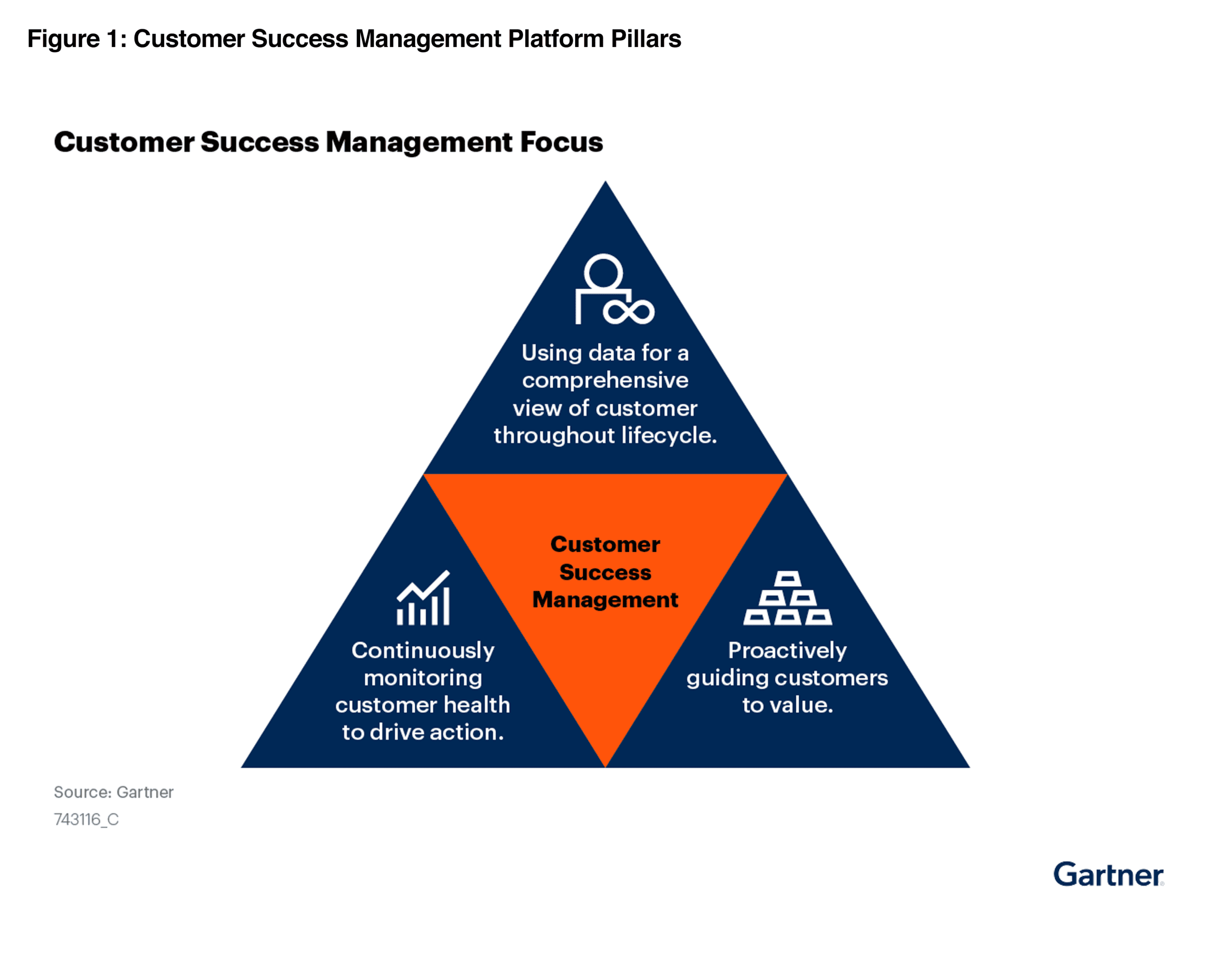In the decade since Gainsight created the customer success (CS) category, the industry has matured from a reactionary stance, answering post-sales and services needs, into a proactive and sophisticated revenue-generating machine.
The 2022 Gartner Market Guide for Customer Success Management Platforms reports that “customer success management (CSM) programs have progressed from an emerging discipline into an increasingly mature and evolving practice.”
Gartner is a company that delivers actionable, objective insight to executives and their teams. In this report, they break down the three pillars of customer success management platforms: “continuously monitoring customer health to drive action; using data for a comprehensive view of the customer throughout lifecycle; [and] proactively guiding customers to value.”

Here are our top three takeaways from the Gartner report.
1. Invest in operations to dial in CS metrics and methods
For many organizations that started with a manual, high-touch approach to CS, it can be difficult to scale, adopt digital tactics, and define the right metrics to evaluate success. This is where we at Gainsight believe a great Customer Success Operations (CS Ops) team comes to the rescue.
Gartner recommends:
“Allocate time and invest in operations resources for customer success to support regular changes by recognizing that your CSM solution will not be a ‘set it and forget it’ system. Instead, continuously evaluate what practices and customer insights might lead to better outcomes.”
This is critical. Customer success looks a little different at every company and for every customer. In order to determine what success looks like, how to measure it, and how to scale through digital tactics like automation, it’s a good idea to bring in a CS Ops function from the get-go.
2. Drive adoption and expansion with product-led growth
In our opinion, leading CSM platforms are poised to work hand-in-hand with product-led growth (PLG) strategies. This does require CS professionals to dive into data sets that they may not be as comfortable with initially, but the benefits are worth it.
According to Gartner:
“Companies pursuing a PLG strategy need to leverage product usage data, in-app guidance, and marketing automation to prompt customers to adopt—and ultimately buy.”
In this way, we feel CS and Product teams are invaluable resources to one another. Joining forces arms Product teams with insights into how the customer drives value from the product—or doesn’t—which in turn informs the product roadmap.
CS can leverage product usage data and in-app messaging channels to guide customers to value. For instance, Customer Success Managers can advise customers to adopt the features that will deliver the right outcomes throughout their journey.
Ultimately, it’s not hard to see how PLG supports both Net Revenue Retention (NRR) and efficient growth through expansion opportunities.
3. Leverage artificial intelligence and advanced analytics
Customer data is bigger than ever. The top CSM platforms, in our opinion, integrate with CRMs, support tools, product analytics, and more. Increasingly, CSM solution providers are finding ways to offer AI and analytics functions so CS teams can leverage this data effectively to drive renewals, expansions, and even new pipeline opportunities.
According to Gartner:
“As CSM practices mature and the volume of data grows, the platforms are increasing the level and types of analytics provided to help practitioners identify best practices that are more effective, plus which behavior and outreach correlates with intended outcomes. This will help to improve the overall performance of the program and team, as well as to provide more accurate forecasting into renewals—and eventually pipeline.”
Just as with the growing prevalence of CS Ops, AI, analytics, and other digital-led strategies are helping CS teams do more with less, without forfeiting a human-first experience for the customer.
We feel the Gartner research makes it clear that CSM platforms are here to stay, offering value across the enterprise. Gartner says:
“CSM platforms provide capabilities to create a holistic view of the customer, guide customers through their journey, and expose customer health packaged in a way that provides accessible insights to all stakeholders that are actionable.”
To us, this rings true beyond the software-as-a-service industry, as well. Organizations outside the technology world are increasingly capitalizing on the value of customer success. We believe our recognition in the report reaffirms the fact that CS has a critical role to play in ensuring successful outcomes for customers and stakeholders of any service.
To learn more about industry trends, read the full report: “2022 Gartner Market Guide for Customer Success Management Platforms.”
Gartner Disclaimer:
Gartner is a registered trademark of Gartner, Inc. and/or its affiliates in the U.S. and internationally and is used herein with permission. All rights reserved.
Gartner does not endorse any vendor, product, or service depicted in our research publications, and does not advise technology users to select only those vendors with the highest ratings or other designation. Gartner research publications consist of the opinions of the Gartner research organization and should not be construed as statements of fact. Gartner disclaims all warranties, expressed or implied, with respect to this research, including any warranties of merchantability or fitness for a particular purpose.

